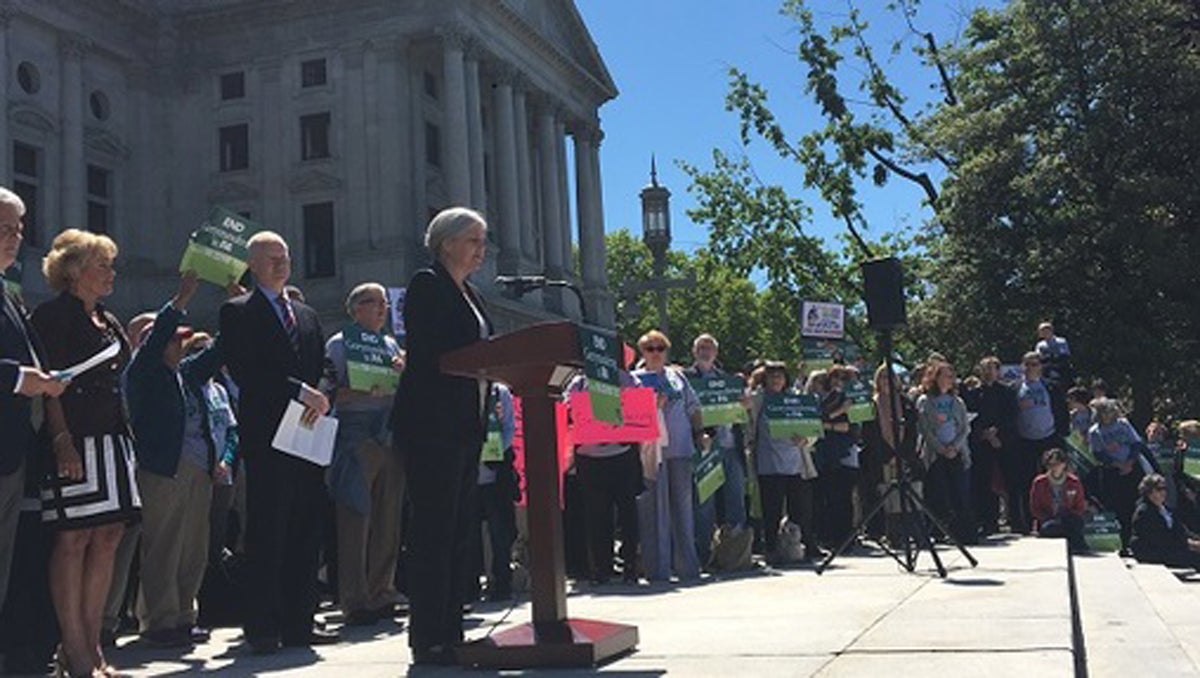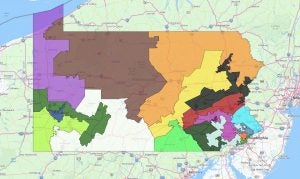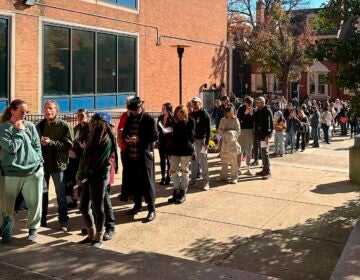Pa. lawmakers advance redistricting reforms as June deadline looms

Members of Fair Districts PA, which advocates for redistricting reform, rally on the Capitol steps. (Katie Meyer/WITF)
Pennsylvania lawmakers have advanced a bill that would change the state’s constitution to put its congressional district map in the hands of an citizens’ commission, one whose 11 members would be chosen by elected officials.
Originally, SB22 called for an independent citizens’ commission, modeled after the process used by states such as California, where individuals can apply to be a part of the deciding panel.
That version also turned over mapmaking to a state Supreme Court advisor, in the event the commission cannot agree.
But the bill was amended Tuesday to call for a commission selected by elected officials — comprised of four registered Democrats, four Republicans and three independents.
Eight commissioners would be picked by party leadership in both chambers (two commissioners per leader) and the remaining three by the governor. The measure requires the commission to approve a map with at least seven votes; if not, the matter would go to legislature, which currently holds mapmaking authority.
The state Senate Local Government Committee voted out the measure unanimously before a small meeting room overflowing with redistricting reform advocates.
The measure would bar elected officials from the commission for five years after leaving office, and task the legislature with “considering” geographic, gender and racial diversity.
Fair Districts PA Founder and Co-Chair Carol Kuniholm had wanted the bill to be more specific about who would be eligible for the commission and how they would be selected.
But Kuniholm and committee chairman Sen. Mike Folmer (R-Lebanon) say they wanted to move the bill. It has to get through both chambers before July 6 in order to stay on track for a new process to be in place by the next time Pennsylvania redraws its congressional districts in 2021.
The full Senate could pass SB22 as soon as June 4.
At recent meetings of the House State Government Committee – where SB22 would likely begin its journey in that chamber – multiple redistricting bills favored by advocates like Kuniholm have been stalled and then overhauled to change their intent.
If the measure does get through the House this session, both chambers would have to pass it again next session. Voters would then have to approve the new process before it becomes law.
The Pennsylvania Supreme Court recently declared the map drawn by the Legislature in 2011 an unconstitutional partisan gerrymander. The map that will be used for congressional elections this year and in 2020 was drawn by a court-appointed expert — a move decried by Republican lawmakers.
Tuesday’s amended bill doesn’t explicitly involve the state Supreme Court in any part of the mapmaking process.
WHYY is your source for fact-based, in-depth journalism and information. As a nonprofit organization, we rely on financial support from readers like you. Please give today.







